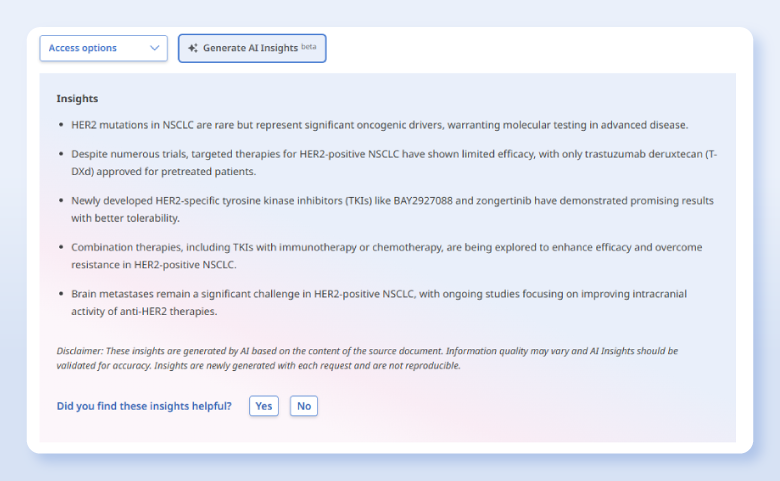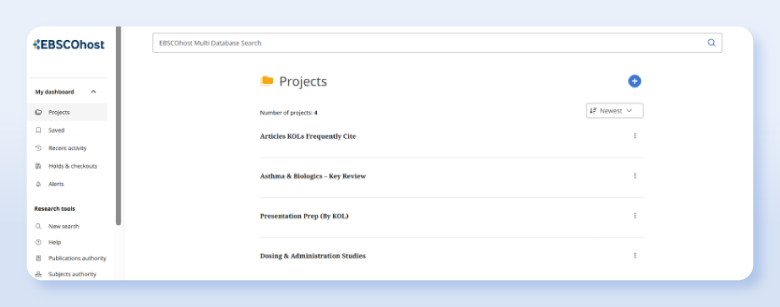Medical Science Liaisons (MSLs) stand at the nexus of data, dialogue, and decision-making. Their role has never been more critical, or more complex.
From engaging with Key Opinion Leaders (KOLs) to responding to nuanced scientific inquiries and managing cross-functional collaborations, MSLs juggle immense responsibilities daily. Yet amid this whirlwind, staying informed through peer-reviewed, evidence-based research remains non-negotiable – and time-consuming.
As the Medical Science Liaison Society aptly states, and in this co-authored article between the MSLS, APPA, IFAAPP and MAPs, MSLs must communicate ethically, accurately, and without promotional bias. But how can they maintain this high standard of scientific engagement without burning out?
One solution lies in smarter research platforms. AI-powered platforms designed to streamline the search for peer-reviewed content and enhance literature reviews, empowering MSLs to discover high-value insights without overwhelm. Here are three ways they can help:
Tip #1: Boosting Search Efficiency
When you're searching for information on a research platform, you want the most useful results to appear first. That's where relevancy ranking comes in - the engine behind delivering fast, high-quality, and accurate search results, saving time and boosting research efficiency.
Relevance is often calculated using several methods:
- Location Matters: Terms appearing in key areas—like the title, abstract, or subject headings—carry more weight than those buried in the full text
- Inverse Document Frequency: Is the term rare or common across the entire database?
- Term Frequency: How often does your search term show up in a document?
- Exact Matches: Results that contain exact keyword matches in important fields are ranked higher.
- Document Focus: Shorter, more focused documents often score higher in relevance than long, unfocused ones.
Together, these techniques ensure MSLs get targeted, relevant results faster and help reduce cognitive load by ensuring MSLs spend more time analyzing, less time refining and restarting their search.
Tip #2: Save Time with AI-Generated Literature Summaries
Another contributor to MSL burnout? The constant pressure to stay up to date with the latest scientific and medical developments. From clinical trials and drug safety data to real-world evidence and evolving treatment guidelines, MSLs must continually synthesize this information to deliver credible secondary research during engagements with KOLs and HCPs. To put an estimation to it, MSLs might spend between 20 percent and 35 percent of their time searching and sifting through academic or scientific literature to support training, continuous education, literature review, and scientific analysis. The rate at which medical and scientific literature is published creates a time-consuming and often unsustainable approach to literature reviews.
That’s where AI Summaries like EBSCO’s AI Insights step in delivering concise, easy-to-digest summaries that highlight 2 to 5 key takeaways per journal article. What makes this feature a game-changer? It’s not just brevity, it’s consistency. AI Insights apply the same clear summary format across a wide range of journal articles. This uniform approach makes scanning and comparing research faster and more intuitive than ever.

Tip #3: Enhance Focus with Personalized Research Dashboards
Managing research content across multiple sources is a time-consuming challenge that often contributes to cognitive overload — leaving MSLs with less capacity for strategic thinking and meaningful scientific exchange. In research-intensive roles, particularly within life sciences and MedTech, a personalized dashboard within a research platform can streamline workflows, boost productivity, and provide much-needed clarity. When evaluating a research dashboard, key features to prioritize include:
- Saved Items: Quickly access important articles, studies, and resources without needing to dig through your history.
- Project-Based Organization: Group documents by topic, therapeutic area, or initiative — ideal for managing multiple priorities or research goals simultaneously.
- Search History & Alerts: Revisit previous queries and set up alerts to stay informed as new, relevant content becomes available.
- Recent Activity Tracking: Easily return to recently viewed materials, ensuring nothing slips through the cracks.

Tip #4: Stay Agile with Scientific Credibility On-the-Go
MSLs are tasked with translating complex science into relevant, digestible discussions. With a research app in their pocket, MSLs can instantly retrieve curated, high-quality literature to reinforce scientific credibility during field engagements and confidently respond to HCP inquiries with peer-reviewed evidence. Whether online or offline, this level of on-the-go access ensures they’re always prepared, agile, and positioned as trusted scientific partners.
- Real-time access to curated, evidence-based content
- Offline availability for use during travel or in low-connectivity settings
- Rapid response to KOL inquiries with peer-reviewed citations
This mobile agility allows MSLs to remain confident and prepared, even while traveling, reducing pressure and improving engagement quality.
By consolidating these tools into a single, user-friendly space, personalized dashboards help streamline workflows, improve focus, and reduce organizational stress.
By consolidating these tools into a single, user-friendly space, personalized dashboards help streamline workflows, improve focus, and reduce organizational stress.
Tip #5: Work Smarter, Engage Deeper
Medical Science Liaisons (MSLs) manage a demanding blend of scientific inquiry, stakeholder engagement, constant travel, internal collaboration, and ongoing learning. It’s a role that requires both precision and adaptability, without burning out.
Modern research platforms are designed to lighten that load. They:
- Minimize redundant research efforts by streamlining access to trusted literature.
- Automate time-consuming tasks like sorting, summarizing, and organizing content.
- Create space for more strategic work and meaningful scientific conversations.
MSLs do more than share scientific data, they shape how that data is interpreted and used. To lead in this space, they need technology that moves as fast as science itself. With the right research tools, MSLs can stay informed, reduce cognitive load, and focus on what truly matters: delivering impactful, credible, and agile scientific exchange.
If you're an MSL — or guiding a Medical Affairs team — consider this: Are your tools accelerating your expertise, or weighing it down?
